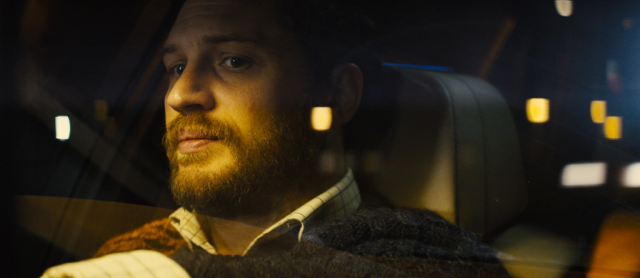
By: Duncan Chalmers
There’s an odd little sub-genre of films where the protagonist is isolated in a confined space, forced to contact the outside world via a telephone. The primary examples, Phone Booth and Buried,developed tension with an ever present threat of death. Although on the surface Locke seems to fit comfortably into this group, further consideration distinguishes itself. Here the suspense derives from human emotion; our conflicted relationship with the character’s situation.
As soon as Ivan Locke (Tom Hardy) steps into his vehicle, the entire film is confined there as he makes a two-hour drive to London. The film’s narrative unfolds through a never ending string of conversations he has over his cellphone. The writing has an intelligent restraint, subtly revealing details to bring us out of our initial ignorance.
We come to understand that Locke is a construction supervisor, and that the next morning he is responsible for overseeing the largest ever concrete pour in Europe. Despite this, he is driving in the opposite direction towards an undisclosed location, eventually revealed to be the birth of a child he fathered in a one-off affair.
These two events provide the fundamental structure of the film’s plot. Locke’s choice to attend the birth threatens the outlook of his life, both in his career and family. All of the conversations deal with this in some way, from Locke attempting to explain his decision to furious employers, to struggling to support his emotionally devastated wife.
What makes this film really flourish is the unorthodox character at its centre. Locke seems to be driven by an unyielding sense of pride and honour. Even after being fired from his job he feels an overwhelming commitment to the success of the construction project.The underlying motivation behind his obligation to the unborn child is also revealed through some bizarre yet intensely powerful conversations.
None of this would have been possible if not for the riveting performance at the centre by Tom Hardy. He breaks free from the physicality that has defined his previous roles, achieving what is likely the greatest performance of his career thus far. Through a combination of striking subtext and body language we are able to fully feel the pain, anxiety and frustration that his character is experiencing.
What makes Locke so successful compared to similar films is the way that everything has purpose. Ivan Locke is not trapped in a situation that manipulates the audience for suspense, that suspense comes from his decision to be in that situation. You clearly understand the actions and responses of the characters, even when they often conflict with each other.
Director Steven Knight embraces the limitations he applies to himself, and through his intricately crafted shooting and editing, proves that you can create a truly cinematic film without many of the stalwarts that have come to define the medium.The result is an incredibly fascinating viewing experience; the best film of the year so far.